Anatomy of an Era: Final Chapter/DEDICATION & DEVOTION
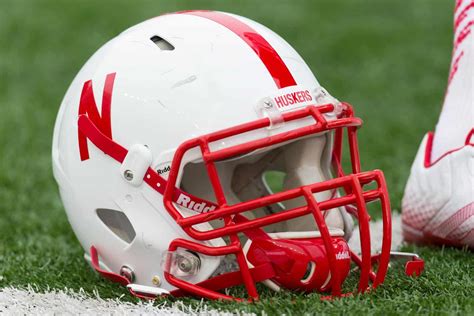
Excerpted from Chapter 104, No Place Like Nebraska: Anatomy of an Era, Vol. 2 by Paul Koch
Anatomy of an Era: Final Chapter/DEDICATION & DEVOTION
DEDICATION/DEVOTION
Along with those goals mentioned yesterday -or “vows”, per se- among the coaches, staffers and student-athletes came the dedication and devotion fueled by the multitude of those motivations. This is another key point upon which those championships hinged, because about 118 other college football teams likely followed the same path: motivation leading to goal setting. The Huskers simply did it better.
Goal setting, conversely, led to greater dedication, discipline and devotion. This group made more sacrifices and endured more discomforts than most, and it was their dedication to each other and their devotion to the process that buoyed them along.
To wit, these teams had a January to January mindset, which made the March through September preparations –and tortures- more capable of being endured. It’s amazing the power those motivations and goals had on psyches, giving them energy and drive and perseverance.
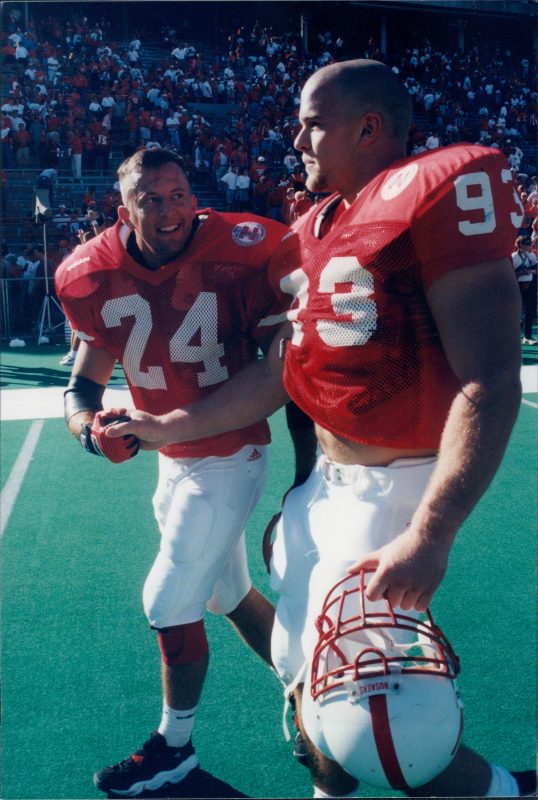
Their dedication started strong & began promptly after the bowl games…
After that game, I think it was a couple of days later, guys started rallying up and getting into the weight room and offseason conditioning and stuff like that. There were no coaches involved, we just did it on our own. It was just something where nobody had to say anything to anyone, nobody had to fire anyone up, no one had to get anyone motivated. That’s who we were. That’s what we did. – Christian Peter
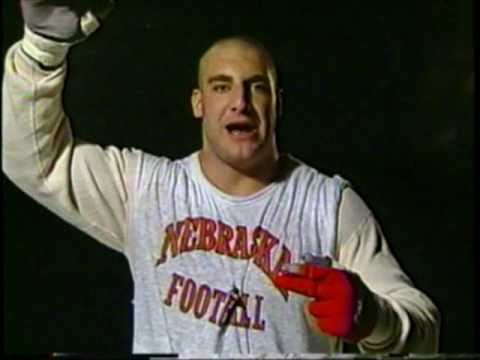
So that would be one major thing, just the level of commitment… we all voted. That was the thing, everybody voted. And there wasn’t one person who said we should take two weeks off. Everybody voted and we all showed up on Monday in the weight room. – Jon Pederson
…those ‘91 guys, ‘92 guys, and ‘93 guys, they were the ones that kind of started getting everything going again and really started getting that team atmosphere and getting everybody to commit. Those workouts in the summer time, I can remember those workouts after ’93; we all made a commitment to each other that we were all going to really work hard in the offseason and get ourselves together… – Doug Colman
…It was the dedication the guys had for the football program, because nobody ever wanted to let Coach Osborne down or their position coaches down… the summer going into the ‘93 season, I don’t think anybody went home. That was the thing. When I first showed up a lot of guys would go home for the summers, and every year that I was there more and more guys would stay there to work out. And it was the national championship year when nobody went home… – Jon Pederson
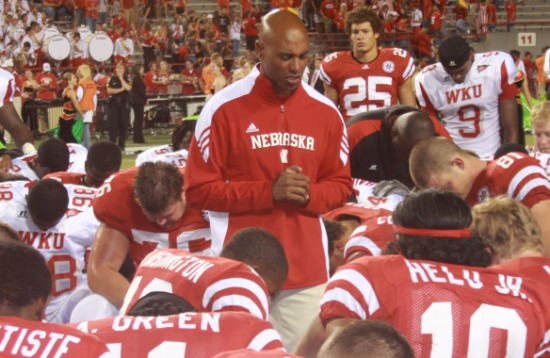
Nothing fired up their dedication more than the narrow loss to Florida State…
…‘93 was a pivotal year because we knew we could be there, but I think it hurt us really bad, because a lot of guys in my class were starting to play. We just knew after that game that, “This will never happen again. You can never say that it will be from a lack of effort or making boneheaded moves where you forget your discipline or responsibilities on certain plays. There’s not going to be any of that. This will never happen to us again.” We worked very hard. – Jacques Allen
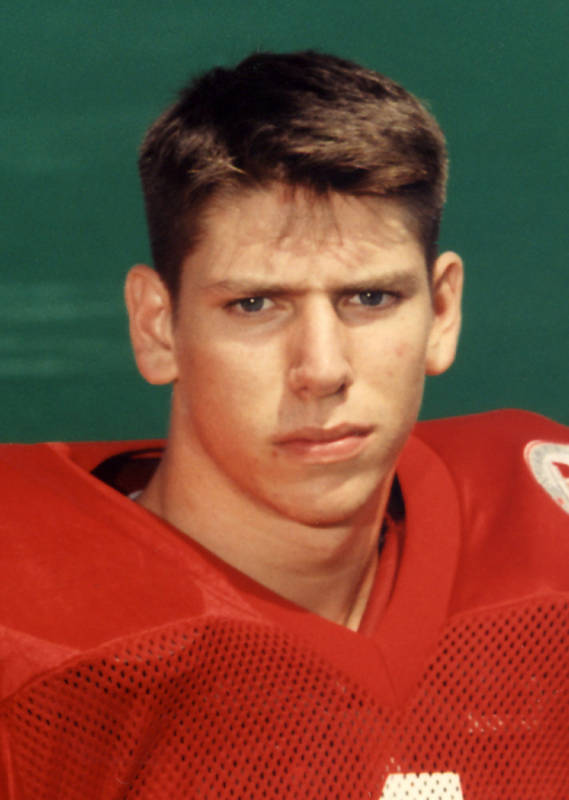
…the most important thing that happened after that loss to Florida State was ‘desire.’ …that next season the desire took over. The discipline on that team took over because of that desire. And Schlesinger was still there, and Chris Norris was still there that next year after I’d left, and I came back a few times that year. The desire to win fueled the commitment, which fueled the discipline and took them to that next level… being hungry by yourself wasn’t going to work, they all had the discipline to follow Boyd Epley’s rules, to do all the strength training, do all the spring practice, get into class at 7 a.m. so you’re in practice at 2 in the afternoon.
– Lance Gray
…it was ‘93, that taste in my mouth, “I can’t believe that that just happened. We beat these guys’ ass up and down the field, and it was taken away from us.” It just pissed you off. – Phil Ellis
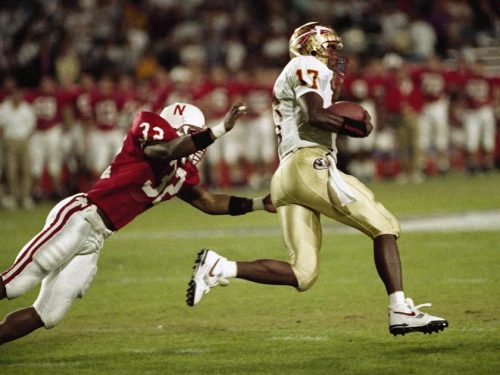
Lasting far into the hot, humid, body-taxing Nebraska summer, the numbers 18-16 and 1:16 were always in the forefront of their minds…
We got back to work after we had our week off. If anybody took attendance -I don’t know if they did- but we probably had 100% attendance for summer conditioning. – Barron Miles
…to see those players get on each other and make sure they’d maximize their effort; there was no slacking off, no half-assing it, no joking around. I mean, those players took that loss to heart and were so motivated by it, then to watch them work in hundred-plus degree heat in Lincoln, Nebraska in June, July and August? It was really remarkable to see them do that. I can remember watching the team thinking, ‘Who’s going to beat these guys? Who’s working as hard?’ There was Christian Peter and Aaron Graham and those guys and they would not let their teammates slack off at all. It was, “Go hard all the time, because we’re not going to end up on the short end of an 18 to 16 game again.” If they would have won that game, I don’t know if there would have been the same motivation in 1994, ’95, ‘96 and ’97. But I tell you what, that loss was certainly the impetus for the greatest run in college football, and it was because the players were accountable to make sure that didn’t happen again. – Bill Doleman
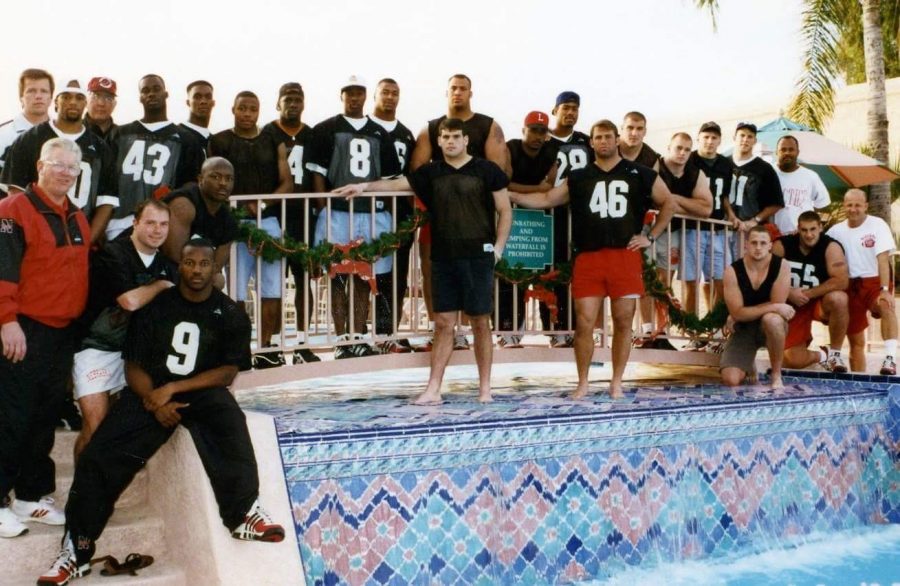
…it’s dedication. Dedication. I’ve never put my heart into something so hard until I learned what it took to be successful. Think about what we did: we didn’t miss a practice or a day of school …every Christmas, every Spring Break, we spent it working out there with you guys. We never missed a summer conditioning program, never missed anything. That was a big deal: Unity, Belief, Respect. We put that up on the bulletin boards, put that up on the wall, that we’d never miss the winter conditioning, summer conditioning, that in order to be the best we’d never take time off. We did that for five years. – Brian Nunns
…It was almost expected that you would be there working out. And it wasn’t from the coaching staff, it was from the players.
– Bryan Pruitt
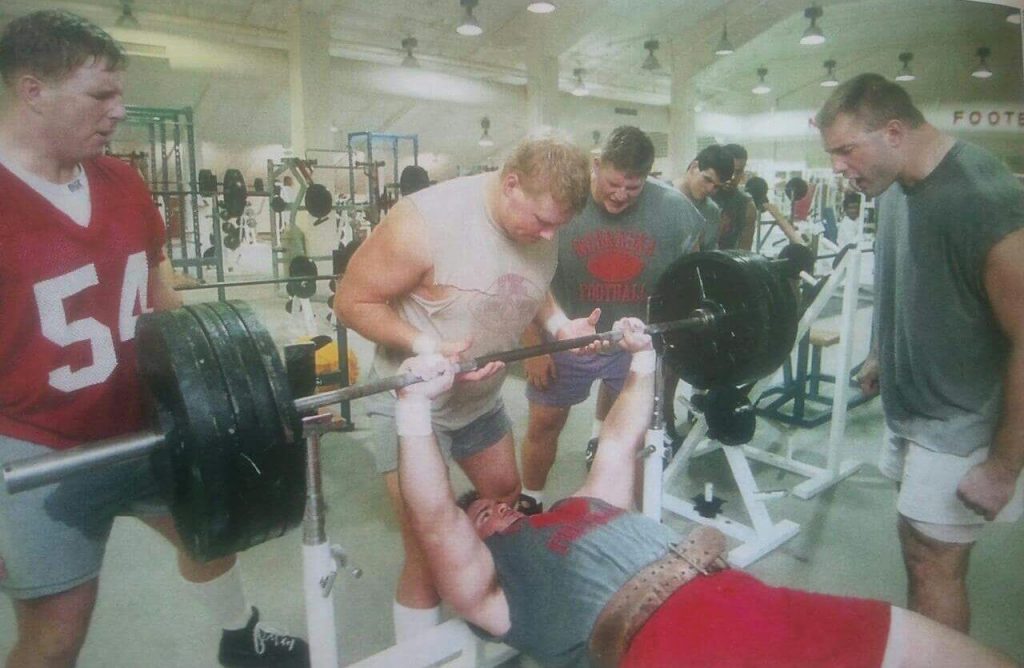
The Pipeline pushing Iron: Aaron Graham, Joel Wilks, Brenden Stai, Zach Weigert & Rob Zatechka w/ Aaron Penland
Reaching into the pre-season scrimmages…
…my hardest games were the Nebraska scrimmages, they were the hardest games I ever played in. The Saturday scrimmages we would have sometimes -and you played against your own linemen, your own guys- you felt beat up. You felt like you got your butt kicked. (laughs) We all felt like that, both ways. I think it was just the amount of good athletes that we had, who were all so dedicated to being the best …It never even factored into your brain that another team would beat you or would outplay you, because we had such good work ethic. We all worked so hard and I think that we all believed that if we worked harder than everybody else, which we did, then there was no reason why we shouldn’t beat everybody else. – Larry Townsend

Available on Amazon.com
And didn’t let up, even when it came to the in-season practices…
…if I’d push my body to a point where you’re just dead, that’s when you felt you’ve actually accomplished something. Trying to pace yourself was not an option. You always pushed yourself to the limit that you think your body couldn’t take it anymore, and then you pushed it a little bit further. – Chris Dishman
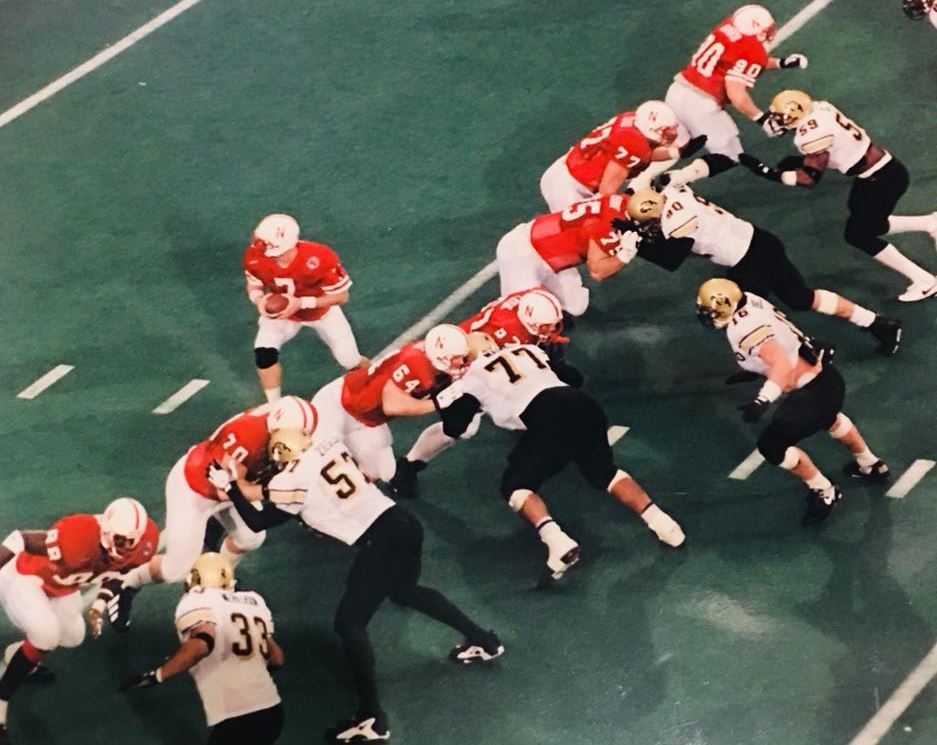
You sucked it up and you went harder than you thought you could go, and it’s things like that that you remember. You don’t really realize how far you can push yourself until you do it. You remember thinking, ‘Gosh, I don’t know if I can do it.’ But you survive, and you find out you can push yourself a lot harder than you think you can… (that loss) hurt too much that we weren’t going to let it happen again. – Terry Connealy
…going into that game, Coach Osborne kept the players in very good shape. Everybody was running gassers and not slacking… for those weeks we never let down on conditioning. – Damon Schmadeke
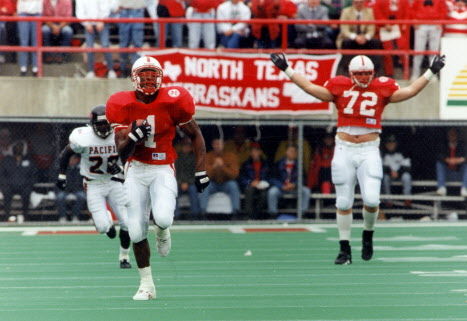
Lawrence Phillips & Zach Wiegert: Open Field.
As well as the contests themselves…
We were taught to be immune to a lot of things, including the freezing cold weather. It would be below zero and they would come out in just their jersey and a half cut or tank top underneath their pads and just play ball. – Jason Scott Jenkins
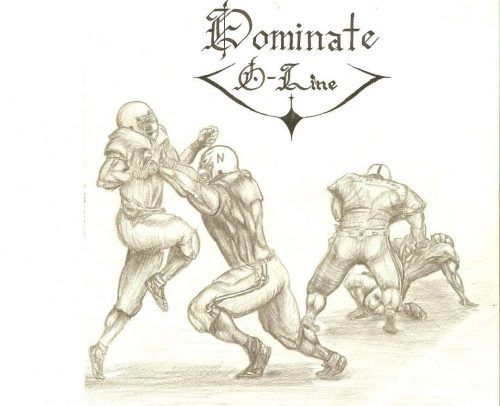
Dominate O-Line artwork by Mike VanCleave
For some, their dedication was an extension of their childhood environment…
My father was a strict immigrant from Germany and was kind of the same mentality where if you were going to do something you were going to put the maximum effort in and be completely dedicated to it. That’s the environment I was raised in. When I got to Nebraska I think it was taken to another level… that’s what every athlete is faced with at one time or another, “Do you want to be great?” It was a bunch of us at Nebraska, we wanted to do that. And there’s a certain effort and certain commitment that goes along with that… It’s not just saying you want to be great, you have to go out and do the things that are going to make the players great. That’s the extra time in the weightroom, studying your opponent, treating Tuesday practice like it’s a game, that’s the way that we operated. – Jason Peter
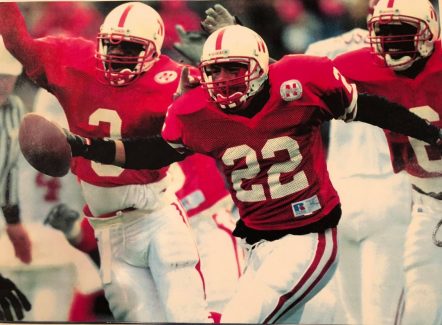
Turnover!
…after I’d committed and signed to the University of Nebraska I’d lost my mom to leukemia in the spring of 1991… You learned how precious life is, how short life is. So it was easy when I heard the cliché speeches about, “Go your hardest every day” or “Make every day as if it’s your last” or “Leave everything out on the field” easier to understand. You know, that’s one thing I’m very proud of, not only in college but in my professional career, is that I gave the game of football every single thing that I could every single day, and none as much as everything I did at the University of Nebraska. The great thing was that the guys who I played with had the same drive and desire to practice harder than anybody, work harder than anybody, and be the absolute best that we could.
– Aaron Graham
And an inner, pre-existent drive…
…off the top of my head, I cannot name a kid that didn’t work hard, that ever went into a game and just took a dump, didn’t play hard, didn’t at least give it all he had. And there are some better than others. And you know, I just think they were a blue-collar bunch of kids… – Charlie McBride
…and Osborne loved all of us so much, he was getting literally 2 hours of sleep a night, and was literally thinking about quitting that year. And you don’t want to be the team that had Coach Osborne quit. – Phil Ellis
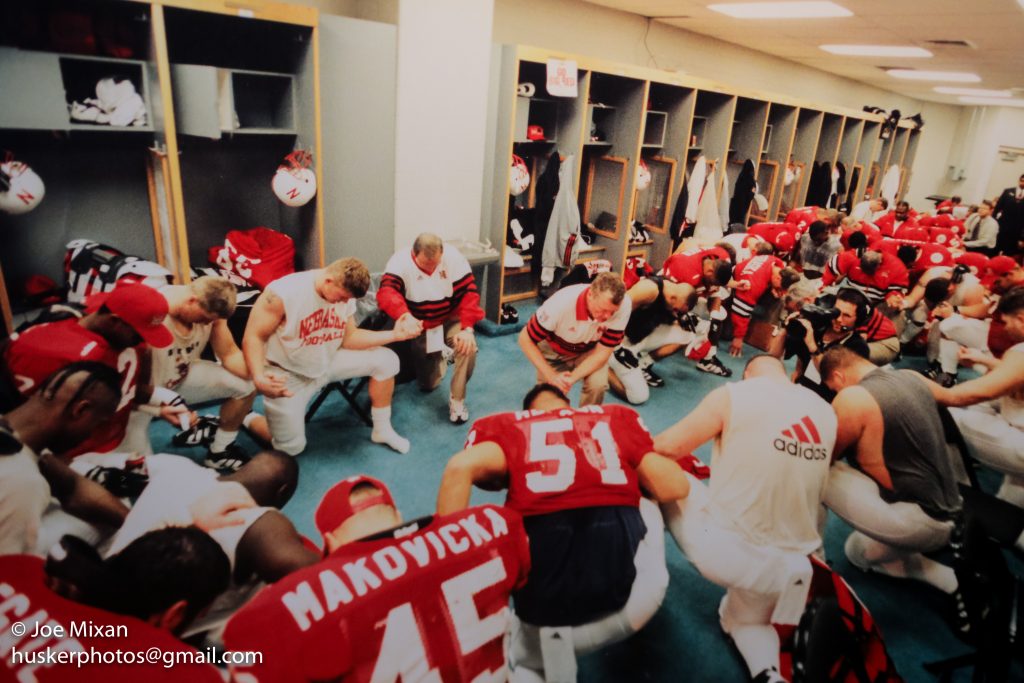
A gathering for prayer
…it was just that bond, that chemistry of playing with the guys those years. I don’t know if it was by chance or what, but we had a lot of similar guys with a lot of motivation and lot of passion about it. And we just had a tight group and were such good friends, and to me that was the key. – Joel Wilks
There were not moral victories at Nebraska. There are no moral victories in life; you play to win. If you’ve lost you’ve lost, and you’ve got to move on… Losing was not in our vocabulary nor in our mentality… we were thinking, “It’s just a matter of time. We’re gonna win because we practiced harder than they did.” – Aaron Davis
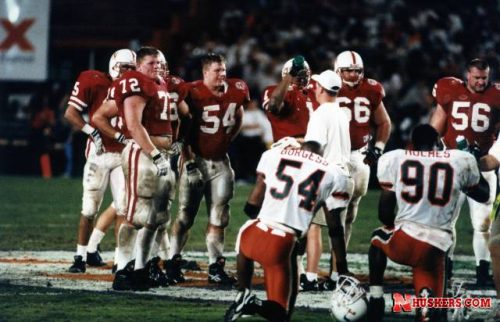
Their devotion also may have begun to exhibit itself by way of exercising self-discipline off of the playing field, as well…
It got to where some guys would walk on the bus and grab our pen and check their own name off after awhile. (laughs)… They were where they were supposed to be when they were supposed to be. There was kind of an inner accountability with those guys. Everybody always asks, “So, how many guys stayed out late?” And I always said, ‘None of them. They’ve all got a game in the morning. Nobody wanted to put that in jeopardy by messing around.’ – Brandon Hamer
They actually gave me a bag of balls. They had like five or six footballs. They told me while I was out there (playing baseball in the Cape Cod League) to punt a few times. So I’d go out on a soccer field a couple times a week by myself and punt it and get it. I didn’t have anyone else to kick with, so I just did it by myself. – Darin Erstad
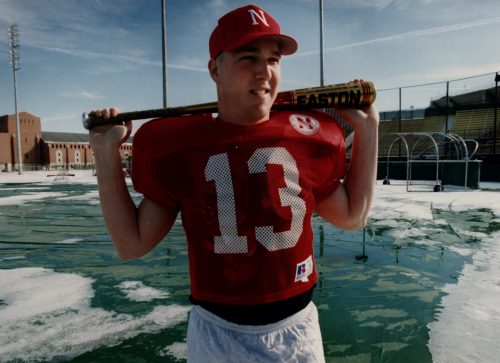
Darin Erstad, 2/94. (Rich Janda photo)
They came to us because they wanted to get better, because they wanted to play and beat whatever opponent they had. Most of that was their will and their drive to excel and be the best they could, and they came to us to use some of our expertise and ‘push’, I guess. We would push them, make them do a little bit extra, a little bit more to get better. – Curt Thompson
…the coaches and the players became more accountable and they concentrated on goals and the focus of having a championship team… their mental toughness was incredible. – Jack Stark
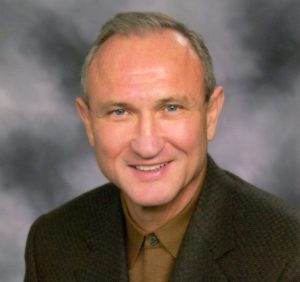
Dr. Jack Stark
Team Psychologist Dr. Jack Stark hit in right on the head: this team was mentally solid. Unmovable, to a point. It had such laser focus, such white-hot desire to reach the top, such drive, such purpose. From a young Ed Stewart playing unrelenting defense in the final minutes of a Miami U. Orange Bowl defeat to the physically brutal, self-directed agility drills under the sultry, baking summer sun on Memorial Stadium’s turf a few years later, this was a very unified, talented, tenacious and persistent team of young men. Perhaps this was the built-in advantage inherent to Lincoln, Nebraska for schooling & sport, where extra-curricular pursuits were at a comparable minimum. Or maybe it was simply a gathering of people so driven that nothing could stop them, be it geography, nemeses’ or racial & cultural dissimilarities. That being said, let’s dig a little deeper into their athletic makeup, coming next…
Copyright @ 2013 Thermopylae Press. All Rights Reserved.
Photo Credits : Unknown Original Sources/Updates Welcomed
Author assumes no responsibility for interviewee errors or misstatements of fact.
Summary Chapter to be continued…..